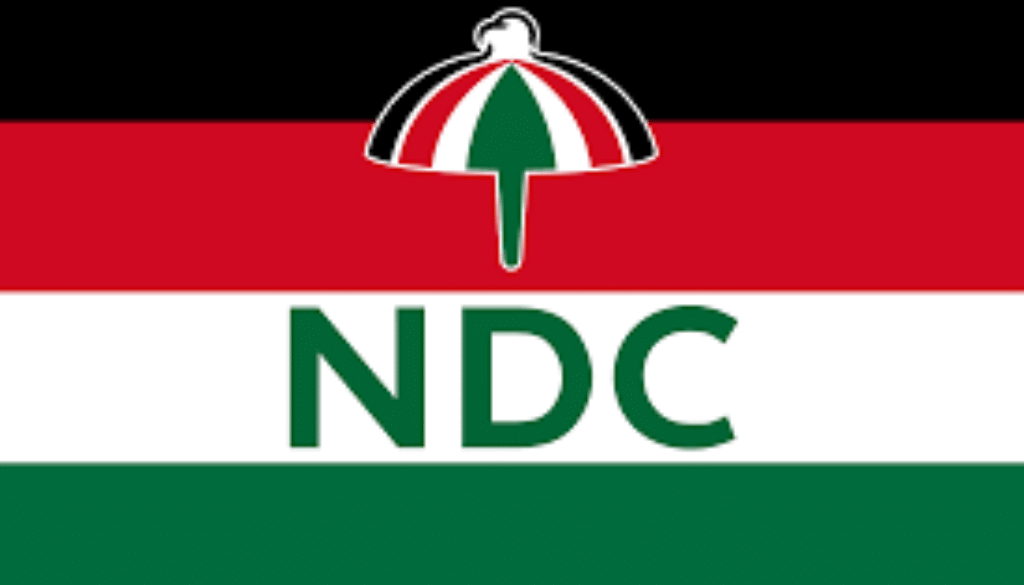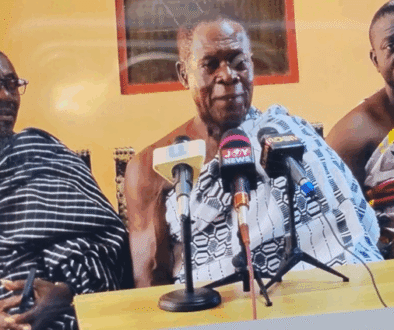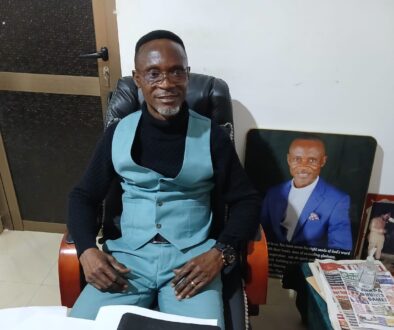NDC’S POSITION ON GHANA-BARARI DV LITHIUM DEAL
PRESS STATEMENT
For Immediate Release
13th December, 2023
NDC’S POSITION ON THE GHANA-BARARI DV LITHIUM DEAL

The National Democratic Congress (NDC) has keenly followed public discussions on the controversial Mining Lease Agreement executed between the Government of Ghana and Barari DV Ghana Limited, for the exploitation of Lithium and other associated minerals in the Ewoyaa community of the Mfantseman Municipality of Ghana.
After a meticulous scrutiny of the terms of the Mining Lease Agreement, the NDC has come to the conclusion that the Ghana-Barari Lithium agreement is not in the best interest of Ghana.
- It is an indisputable fact, that mining hasn’t benefited us as a nation over the years. Hence, there is the need for an urgent review of the country’s existing mining laws and policies, particularly in relation to green minerals.
-
This is why the flag-bearer of the NDC, H.E John Dramani Mahama has promised to review the laws that govern the extractive industry, in order for the country to maximize her share and local participation in the exploitation of our natural resources.
-
The NDC holds the view, that the green minerals of the country, should not be exploited based on the existing mining laws and policies, which are predominantly tailored for gold mining and have not benefited the nation over the years.
-
We are of the firm opinion, that it is about time the existing colonial model of mining lease concession agreements, was reviewed. New models for the exploitation of our mineral resources such as Joint Ventures and Service Agreements, that provide for equitable benefit sharing, enhanced local participation and value addition, should be considered as part of the review of the laws and policies governing our extractive sector.
-
Our beloved country urgently needs a reviewed mining regime, that provides for the sustainable funding and strengthening of the Ghana Geological Survey Authority, to engage in reconnaissance and prospecting, particularly in relation to green minerals. We believe that this, if supported by the Minerals Income and Investment Fund (MIIF) under the right policy framework, will enhance the bargaining power of the state in the exploitation of our mineral resources.
-
It is for these reasons, that the Akufo-Addo/Bawumia/NPP government should have extensively engaged all affected local communities, as well as key stakeholders including CSOs in the extractive sector, before executing the Barari-Lithium agreement. Sadly, there has been very little engagement by government with the affected local communities and key stakeholders in the processes leading to the execution of the controversial lithium deal. The NDC believes that, all stakeholders in the extractive sector must have a say in the kind of law and model, under which our lithium and other green minerals should be exploited for the maximum benefit of the State.
-
Aside the fundamental issues enumerated above, there are certain germane issues about the terms of the Ghana-Barari DV lease agreement that are worth highlighting:
I) First and foremost, the requirement in the mining lease agreement for the establishment of a chemical plant to process our lithium locally, is very weak to say the least.
- We note with concern, that under Schedule Two (2) of the lease agreement, the establishment of a local chemical plant by the company is not mandatory, but contingent on the conduct of a scoping study to determine the economic viability of the processing of lithium in Ghana.
-
Even more worrying, is the fact that, paragraphs 1(b)(c) and (d) of schedule two (2) of the lease agreement, envisages the inability of the company (Barari DV) to meet this requirement. This makes nonsense of the claim by government that no raw lithium will be exported from Ghana under the agreement.
II) Secondly, there are no specific provisions in the mining lease that emphasize Ghana’s control over the lithium mining value chain and the benefits thereof.
- In the extractive sector, the ability of a country to optimize gains from the value chain is the surest way of domesticating benefits.
-
The NDC wants a deal that provides a clear and unambiguous strategy for maximizing the benefits of lithium mining through value chain participation. There is therefore the need for mandatory requirements for the local processing of raw lithium before it is exported out of the country and a 100% off-taker for the by-products thereof (i.e Feldspar, Silica, Kaolin etc.) for local industries and manufacturing companies.
III) On the claim by government, that Barari DV will be paying corporate tax of 35% under the deal, it is important for government to clarify the status of the company and provide the full facts relative to concessions that have been granted the company.
*What the Mining Lease expressly provides is that, Barari DV shall pay taxes in accordance with the mining laws of Ghana, without more.
- We are however told that the Company is registered under the Ghana Free Zones Authority and is entitled to a 10-year tax holiday, when such tax concessions are ordinarily not granted to mining companies in the country. This if true, will deprive the country of corporate taxes during the first ten years of the Ewoyaa Lithium project. This will effectively limit Ghana’s share to the paltry 10% royalty and marginal benefits from our 13% carried interest and the 6% equity held by the Minerals Income Investment Fund (MIIF).
-
It is therefore imperative, for government to clarify the status and tax obligation of Barari DV and its parent company. Ghanaians deserve to know whether or not the company is a free zone company and why a mining company should be accorded free zone status. Ghanaians deserve to know all the concessions government is giving the company (Barari DV/Atlantic Lithium) for a holistic assessment of the benefits of the deal.
-
Beyond that, strict provisions on tax compliance and enforcement are required to ensure that the state is not cheated through transfer pricing and creative accounting.
IV) It is important to make the point, that government’s boastful claim about securing a 10% Royalty under the deal, is a celebration of mediocrity.
- It is worthy of note, that the prevailing royalty rate of 5% was based on section 25 of the Minerals and Mining Act, 2007 (ACT 703), which provides for a royalty rate of not less than 3% and not more than 6%. This law was amended by the erstwhile NDC/Mahama government, as far back as 2015 by ACT 900, which has made the Royalty rate open-ended and subject to negotiations.
-
Also, the prevailing industry royalty rate of 5% relates to the country’s traditional minerals such as gold, bauxite etc. The Barari-Lithium agreement is the first deal for the exploitation of a Green Mineral in Ghana. Therefore, comparing the prevailing royalty rate of 5% to a 10% royalty rate for a Green Mineral like lithium, is an exercise in mediocrity.
-
More importantly, we think that government should have opted for a flexible range of royalty rate, which takes into account windfall profit of the company. This royalty arrangement has been adopted by Chile, which currently has a royalty rate range of 8% to 21% depending on certain variables. In similar vein, the 10% royalty rate secured by government could have been the baseline rate, subject to upward adjustment in cases of windfall revenue or profit by the company, if government had negotiated properly.
V) Also, the requirement in the mining lease agreement for Barari DV or its parent company, Atlantic Lithium, to list on the Ghana Stock Exchange, is problematic for several reasons, including the following;
● No specific time-frame has been provided in the mining lease agreement for such listing.
● Listing on the Ghana Stock Exchange (GSE) may not necessarily benefit Ghanaians as foreigners can invest on the GSE and/or hide behind Ghanaian fronts to buy shares.
● Over the years, similar arrangements have largely benefited a few rich and powerful Ghanaians and not the ordinary Ghanaian.
● Ghana’s own previous experience with the listing of Anglogold Ashanti shares on the Ghana Stock Exchange, where Ghanaians who purchased shares completely lost out, should awaken us to the fact that, listing on the Ghana Stock Exchange can go wrong.
Suggestions for the Minerals Income and Investment Fund (MIIF) to acquire the said 11% Equity in the Ghana operations of the Barari DV, for and on behalf of the people of Ghana, is therefore worth considering.
VI) These facts completely belie the claim by government, that Ghanaian participation in the Ewoyaa Lithium project will be 30%. Beyond Ghana’s Free Carried Interest of 13% and the wholly inadequate 6% Equity acquired by MIIF, there are no specific provisions in the lease agreement that provide with certainty, a Ghanaian participation rate of 30% in the foreseeable future.
VII) Again, it is interesting to note, that under the shareholding structure of the company, there is a 4.4% Equity in the name of “Previous Land Owners”. In the spirit of transparency, the NDC demands a full disclosure of the identities of the Beneficial Owners of that 4.4% Equity and how that was arrived at. Ghanaians deserve to know who these “previous land owners” are.
- In the face of all these pertinent issues, particularly, the non-existence of a feasibility report and a mandatory requirement for the local processing of our lithium resources, the NDC is of the view, that the Ghana-Barari Lithium deal is not in the best interest of Ghana. Thus, the ratification of the Mining Lease agreement executed by the Akufo-Addo/Bawumia NPP Government, should not even arise at this stage.
It is our considered position, that Parliament should not consider the ratification of the Lease Agreement until all these pertinent issues are satisfactorily addressed in the best interest of Ghanaians.
SIGNED.
SAMMY GYAMFI ESQ.
(NATIONAL COMMUNICATIONS OFFICER)






